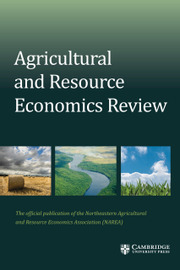Article contents
Economic Science and Public Policy
Published online by Cambridge University Press: 15 September 2016
Abstract
In this article, research on the application of science to policy issues is reviewed and applied to economic science. Economists who want their professionally credentialed economic research to have an impact on public policy are advised to consult with policy decision-makers in framing their research questions and throughout the research process, thus assuring that the resulting findings will be relevant. A minimal degree of bias in framing, conducting, and presenting research complements a high degree of relevance for the results, allowing economic research to make a difference.
- Type
- Invited Papers
- Information
- Copyright
- Copyright © 2013 Northeastern Agricultural and Resource Economics Association
References
- 5
- Cited by




